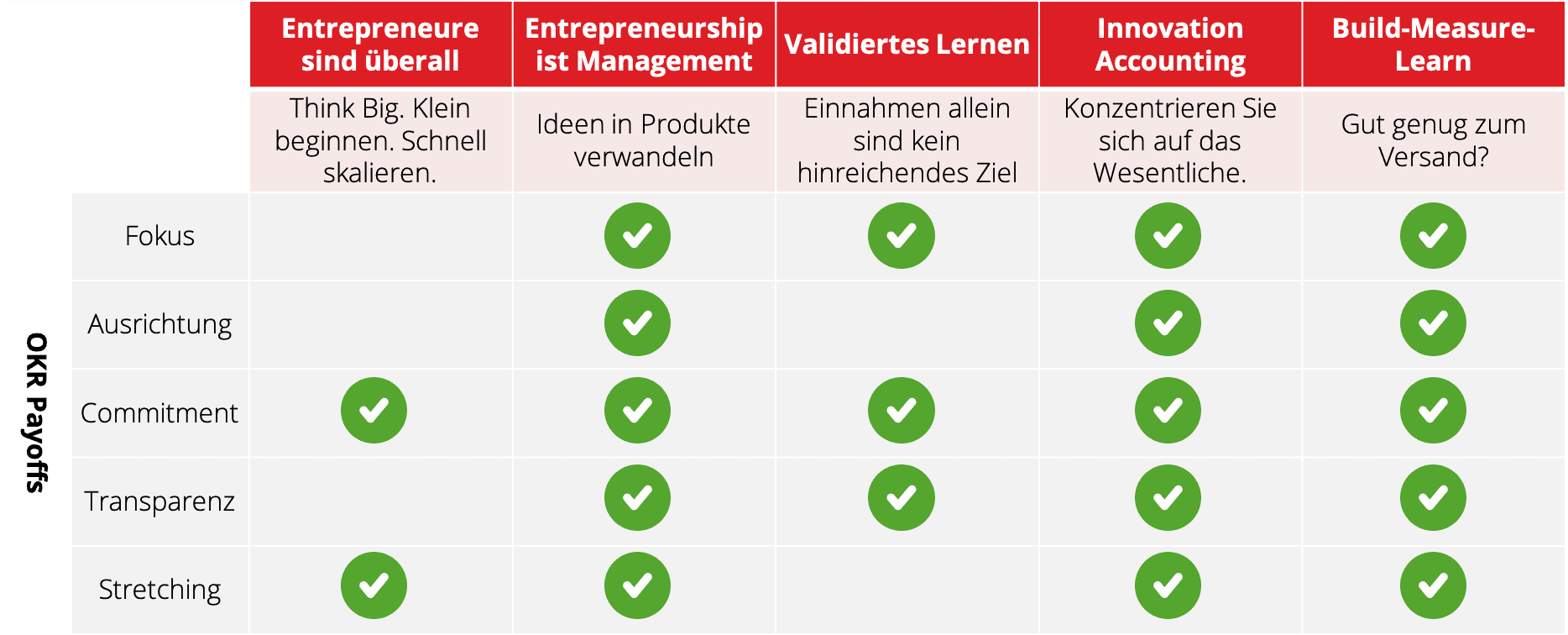
04 May Lean Startups vs. OKR – a comparison
Lean Startups vs. the OKRs method
OKRs are a fantastic way to manage startups. Why? Let’s take a look at a comparison between OKR and the Lean Startup movement. The two methods complement each other wonderfully.
We have already described OKR payoffs in detail in this article. They are summarized under the acronym FACTS.
Focus
Alignment
Commitment
Tracking
Stretching
Basic principles of the lean startup movement
Before we get to the comparison between Lean Startups vs. OKR, let’s take a closer look at the five basic principles of the Lean Startup movement.
Entrepreneurs are everywhere
The idea behind Lean Startup is that you can be an entrepreneur anywhere. It breaks with the cliché that all entrepreneurs start out in a small garage before becoming successful superpowers. So never underestimate the spirit of a true entrepreneur.
Entrepreneurship is management
A start-up begins with an idea that is turned into one or more products and around which a company must then be built. Entrepreneurship is basically a special kind of management: it has the task of building a company from an idea.
There are many disputes between representatives of entrepreneurial management and other types of management. While it’s true that slightly different processes are required to run a $0 to $10 million company versus a $10 million to $100 million company – both are essentially management. And that is the core of this principle.
Validated learning
Validated learning is the “unit of progress” for lean start-ups. In the early days, there are no rigid metrics to follow. So you don’t measure your success by the money you earn. Instead, measure it by the amount of feedback you receive from your potential customer base.
Typical steps in validated learning are
- Specify the goal
- Define a metric that represents the target
- Acting to achieve the goal
- Analyzing the metrics – are you closer to your goal?
- Improve, learn and try again
Some of these steps are very reminiscent of OKRs.
Innovation Accounting
A startup has to set up its own‘innovation accounting system’. Think of OKRs again here. Innovation accounting is a way to evaluate your progress when all other metrics typically used in an established business are effectively zero. There are some KPIs that are recommended in the world of lean startups. Typically, they are divided into 3 levels and range from simple customer reactions such as completing a certain action on your platform to net present value.
Build-Measure-Learn
The build-measure-learn loop is essentially the lean startup process and can be summarized as follows:
- Build: Turn your ideas into code. You can also replace “code” with “prototype” to extend this idea to other sectors.
- Measure: Bring your product to market and collect performance data.
- Learn: Analyze performance data and improve your ideas for the next iteration in the product cycle.
A comparison of the two methods
For the comparison between Lean Startups vs. OKR, we have developed a matrix that links each of the OKR payoffs with one of the Lean Startup basic principles.
Entrepreneurs are everywhere
Entrepreneurs are generally very committed and very ambitious. You might also argue that they are very focused, but that’s not necessarily true. The founding team usually consists of 1 to 2 people who should keep the focus.
Entrepreneurship is management
OKRs are the best way to manage any kind of task. A good management method will therefore benefit from all OKR payoffs, and the lean startup process is no exception.
Validated learning
On the one hand, you can use OKRs to define what you actually want to achieve – i.e. your goal. On the other hand, OKRs can also be used to track your progress towards this goal and adjust along the way if necessary.
Innovation Accounting
It is simple. Simply use OKRs for your innovation accounting. To do this, identify your target status and define objectives and key results. Track these periodically and then move on to the next iteration cycle.
Build-Measure-Learn
If we had to name one core principle of the lean startup movement that OKRs fully cover, it would be this. Pretty much every iteration you go through here should ideally consist of a series of OKRs. In a later article, we will look at some OKR examples for lean startups.






